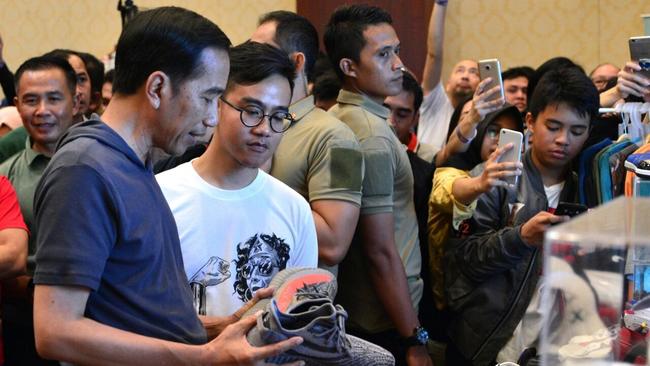Indonesian court clears pathway for Jokowi dynasty
Decision clearing way for Jokowi son to run for vice-president could reshape political alliances ahead of February elections.

A controversial ruling by Indonesia’s constitutional court has cleared the way for President Joko Widodo’s son to run for vice-president in next February elections, despite warnings the decision would entrench political dynasties and potentially compromise the legitimacy of future elections.
The long-awaited decision by a panel of nine judges on six separate petitions _ all seeking to reduce the allowable age of presidential and vice-presidential candidates from 40 to 35 _ ruled against lowering the age limit but in favour of opening the electoral race up to younger candidates who had served in elected positions.
“Age requirements for presidential and vice-presidential candidates must be based on the principal of providing opportunities and eliminating restrictions in a rational, fair and accountable manner,” the court ruled.
“Therefore, there are two entry points in terms of age requirements…namely being 40-years-old or having previously held a position elected through…general elections, including regional head elections”.
The ruling _ which will allow elected officials down to the level of city councillor to run for high office _ means Gibran Rakabuming Raka, the 36-year-old mayor of Solo and oldest son of Jokowi, may now run for the country’s second highest office.
The big question now is whether he will do so, and with which presidential nominee. Registrations open for candidates on Thursday.
Most, if not all of the petitioners, were Jokowi supporters seeking a path for Gibran to contest elections in order to preserve the political power of his father who is constitutionally-bound to step down at the end of his second term next October.
Among them was the youth-based Indonesian Solidarity Party (PSI), a key Jokowi backer that last week appointed the President’s youngest son, Kaesang Pangarep, as its chairman.
Despite the President’s huge popularity, the push has sparked protests in Jakarta, and on Monday police were forced to shut down streets around the central Jakarta court to contain demonstrators both for and against the amendment.
The court’s decision to allow younger candidates with sufficient political experience to run for high office is controversial for multiple reasons, though legal experts have focused on the fact it is not a constitutional issue and therefore outside the court’s remit.
Many have also pointed to a conflict of interest for Constitutional Court chief judge Anwar Usman who is the President’s brother-in-law, Gibran’s uncle.
Justice Anwar has refused to recuse himself from the court’s deliberations.
Indonesian constitutional law expert Bivitri Susanti said the ruling would solidify political dynasties, “which are even worse than (during) the Suharto era”.
“At least during the New Order, you could criticise it, criticise Suharto, but now they‘re using the judicial system. That’s an extraordinary regression of democracy to strengthen a political dynasty,“ she said ahead of the ruling, referring to new laws criminalising criticism of the president and vicepresident.
National Research and Innovation Agency (BRIN) researcher Aisah Putri Budiatri also warned an affirmative ruling would be seen “as a form of political engineering (that) ultimately affects the legitimacy of future elections”.
Clearing the way for Gibran’s candidacy could also reshape political alliances ahead of the polls.
Jokowi’s own Indonesian Democratic Party of Struggle (PDIP) – controlled by Megawati Sukarnoputri, a former president and daughter of Indonesia’s founding father Sukarno – has nominated central Java governor Ganjar Pranowo as its presidential candidate.
Jokowi has been hedging his bets in a bid to secure his own legacy and a vehicle to maintain his political power after he leaves office, given his long history of tension with Megawati.
Many saw the elevation of his younger son to the chairmanship of the PSI as part of that strategy.
While the President has backed his party’s presidential pick, he has also been building support for his defence minister Prabowo Subianto, a former special forces commander accused of human rights violations against West Papuans as well as activists who opposed the former Suharto military regime that toppled in 1998.
Both leading candidates have indicated they would continue Jokowi’s economic policies and also support his legacy project, the construction of a new capital city in Kalimantan.
Prabowo has lost two presidential elections to Jokowi, but is now considered a frontrunner given Jokowi cannot contest a third term, and next year’s three-way presidential race is predicted to go to a second round.
In that scenario, Islamist supporters of a third presidential contender, former Jakarta governor Anies Baswedan, are widely expected to shift support to Prabowo, the 71-year-old former son-in-law of Suharto.



To join the conversation, please log in. Don't have an account? Register
Join the conversation, you are commenting as Logout